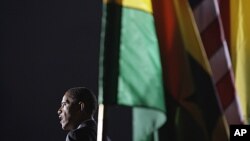While President Barack Obama spends the last year of his current term in office with many pressing issues, including trying to get re-elected, African analysts and advocates say policy toward sub-Saharan Africa ranks as a very low priority. This has come as a disappointment to some as Obama's father was from Kenya.
While walking onto the House floor to deliver his recent 2012 State of the Union speech, President Obama told U.S. Defense Secretary Leon Panetta "great job tonight."
It was later explained the comment referred to a late night U.S. military raid into Somalia to free two hostages including an American aid worker.
But Obama's actual speech made no mention of sub-Saharan Africa whatsoever.
Kwaku Nuamah, a Ghanaian professor at American University in Washington, is not surprised.
"Africa is not big in Washington, there is no constituency that cares about Africa that much," said Nuamah. "I did not think the traditional contours of American foreign policy were going to change because there was somebody in the White House with ties to Africa, but of course a lot of people expected that."
Since making a speech in Ghana in 2009 about how the United States would hold African leaders accountable to good governance and respecting democratic institutions, President Obama has not returned to the continent.
Emira Woods from Washington-based Foreign Policy in Focus says actual change though is more important than visits and speeches.
"Wonderful words, but very much unfulfilled," said Woods. "Those words have to be lived in terms of U.S. foreign policy and we are still waiting for them to be realized."
Woods says she feels too much attention is placed on U.S. military aid in resource rich countries, without regard to a government's record or how elections are conducted.
This includes help for Nigeria's embattled government to eliminate Islamic extremists, and assistance in autocratic-run east and central African countries to squash the roving Lord's Resistance Army.
Patrick Mubobo, a Congolese American recently protesting in front of the White House, is one of those bitterly disappointed, after the U.S. government did little following flawed 2011 elections in his native mineral-rich and heavily U.S.-assisted Democratic Republic of Congo.
"We want to tell him it is over if he does not do the right thing for Congo, for children who are crying and dying if he does not do the right thing for democracy, he can count that he has not only lost my vote, but he has lost a lot of votes," said Mubobo.
Congolese Americans at this recent protest said they had campaigned vigorously for Obama in 2008 and even rallied for his health care legislation, but that now they felt disillusioned with the way the U.S. government was dealing with Africa and Africans.
U.S. officials point to recent successes in Africa, such as helping diplomatically as South Sudan became a new country last year, giving assistance to millions of victims to overcome drought in the Horn of Africa, and pursuing major health initiatives to fight AIDS and other diseases.




